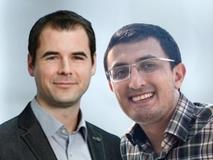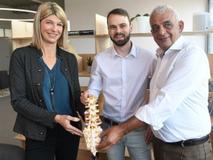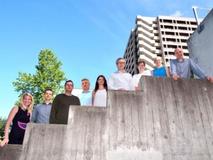Startups developing a software to automate brain tumor detection, suspended drones for harvesting, innovative spinal care, an IR camera for authentication of artworks, and next generation cancer diagnostic and monitoring each win CHF 10,000
08.01.2021
cancerscan.ai, Floating Robotics, InnoSpina, MATIS, and Oncobit win Venture Kick's first stage of financial and entrepreneurial support. Their projects help radiologists save time and money by detecting and classifying brain tumors on magnetic resonance imaging, propose a different robotic solution for harvesting midsize and hilly farms, advance minimally invasive (MIS) and motion-preserving technologies for disorders of the spine, help art experts to authenticate paintings before a sale, and enable personalized cancer care.
6.jpg) |
 cancerscan.ai: Paul Windisch
|
 Floating Robotics: Advisor Prof. Marco Hutter and Founder Salman Faraji
|
 InnoSpina: from left to right, CFO Nicole Beuchat, CEO Gwenael Hannema, and Chief Medical Officer Dr. med Jacques Samani
|
 MATIS: from left to right, Marie Didier, Charles Bret and Dylan Cotta
|
 Oncobit: From left to right: Dr. Claudia Scheckel, CEO - Dr. Stefan Bleuler, bioinformatics and software development - Dr. Patrick Turko, freelance bioinformatician - Dr. Tomas Hruz, bioinformatics and software development - Dr. Elisa Bellini, Innosuisse-paid biologist - Prof. Mitch Levesque, scientific advisor - Dr. Barbara Geissmann, Innosuisse-paid software engineer - Dr. Sandra Freiberger, freelance biologist - Prof. Michael Krauthammer, scientific advisor
|
cancerscan.ai: automating brain tumors detections on MRI
Floating Robotics: Suspended manipulotrs redefining mobility for harvesting
There is a high potential for food production in Switzerland, but many farms are too small to be economically viable, and the hilly type of terrain in some parts makes the application of large-scale agricultural machinery economically and technically difficult. This project aims at proposing a different robotic solution for midsize and possibly hilly farms or gardens in Switzerland. Floating Robotics can address a growing demand for gardening automation in sloped and hilly areas where industrial machines can't operate. The team composed of founder Dr. Salman Faraji, Ph.D in Robotics at EPFL and currently postdoc at ETH Zurich, with advisor ETH Prof. Marco Hutter have devised a robotic manipulator suspended on cables. It moves over gardens of arbitrary inclination and performs tasks such as removing leaves, spraying fungicides, pre-pruning or monitoring. An analysis of vineyards in Switzerland reveals substantially lower costs for these tasks in flat gardens, where machines have replaced human labor. Their low-cost robot can handle these simple yet labor-intensive tasks on solar power. Floating Robotics have found great initial traction in the vineyard market which is their initial focus. With further software developments, their robot scales to other high-value crops and vegetables.
The Venture Kick funds will help them collect vast amount of data to train realistic vision algorithms, establish stronger links to their pilot gardens, and hire engineers to start designing and developing their MVP.
floatingrobotics.com
InnoSpina: Spine surgery, simplified.
MATIS: IR camera for authentication of artworks
Oncobit: Next generation cancer diagnostic and monitoring
Brain tumors, whether they originate directly from the brain or spread to the brain when a cancer somewhere else in the body becomes metastatic, are a costly problem to healthcare systems, especially in industrialized nations. The task of detecting and classifying brain tumors on magnetic resonance imaging (MRI) is currently performed by trained radiologists who can do so with decent confidence in many cases. However, automating this task would provide immense benefits in terms of patient safety when the automatic detection serves as a second opinion and could support the physician by taking over certain parts of the radiology workflow, thereby making radiologists more efficient which will save time and costs. The project is currently funded through a BRIDGE grant from the Swiss National Science Foundation and Innosuisse and conducted by Paul Windisch who works at the cantonal hospital Winterthur which is a teaching hospital of the University of Zurich. The goal is the development of an architecture of neural networks to detect and classify the most common brain tumor entities which can then be licensed to MRI manufacturing companies.
The Venture Kick financing will help to cover intellectual property costs and to set up a pilot phase.
The Venture Kick financing will help to cover intellectual property costs and to set up a pilot phase.
Floating Robotics: Suspended manipulotrs redefining mobility for harvesting
There is a high potential for food production in Switzerland, but many farms are too small to be economically viable, and the hilly type of terrain in some parts makes the application of large-scale agricultural machinery economically and technically difficult. This project aims at proposing a different robotic solution for midsize and possibly hilly farms or gardens in Switzerland. Floating Robotics can address a growing demand for gardening automation in sloped and hilly areas where industrial machines can't operate. The team composed of founder Dr. Salman Faraji, Ph.D in Robotics at EPFL and currently postdoc at ETH Zurich, with advisor ETH Prof. Marco Hutter have devised a robotic manipulator suspended on cables. It moves over gardens of arbitrary inclination and performs tasks such as removing leaves, spraying fungicides, pre-pruning or monitoring. An analysis of vineyards in Switzerland reveals substantially lower costs for these tasks in flat gardens, where machines have replaced human labor. Their low-cost robot can handle these simple yet labor-intensive tasks on solar power. Floating Robotics have found great initial traction in the vineyard market which is their initial focus. With further software developments, their robot scales to other high-value crops and vegetables.
The Venture Kick funds will help them collect vast amount of data to train realistic vision algorithms, establish stronger links to their pilot gardens, and hire engineers to start designing and developing their MVP.
floatingrobotics.com
InnoSpina: Spine surgery, simplified.
Lower back pain is an extremely common health problem and leading cause of activity limitation. One common condition is Lumbar Spinal Stenosis (LSS) and is the most frequent and fastest growing reason for spinal surgery in patient older than 65. Current solutions are either too expensive or invasive and often require general anaesthesia with long recovery time or involve high surgical risks. InnoSpina’s team – Chief Medical Officer Dr. med Jacques Samani, CEO Gwenael Hannema graduated from mechanical Engineering at EPFL, and CFO Nicole Beuchat – are advancing minimally invasive surgery (MIS) with fusion and motion preserving technologies for the disorder of the spine. They developed and preclinically validated a first implant combined with a simplified, safe and fast implantation procedure enabling up to a 5x speedup compared to the current golden standards. Their intuitive guiding instruments will empower surgeons and permit ambulatory treatment options giving patients access to the care they need. Supported by an Innosuisse project InnoSpina will bring the next generation implant on the market, answering a large unmet medical need and pursuing their vision to make spinal treatments safe, fast and accessible.
The Venture Kick funds will be used in new marketing material, enabling to meet and gain traction by other spine KOLs. innospina.com
The Venture Kick funds will be used in new marketing material, enabling to meet and gain traction by other spine KOLs. innospina.com
Art has always been a place for investment, yet reserved for high value artworks and privileged individuals. Nowadays, middle-range value artworks, preponderant in the art market turnover, is becoming a suitable investment with appraisals up to 20% after authentication. Still, as half of artworks in circulation might be fake, middle-range value artworks are perceived by new investors as risky: thorough art expertise relying on rigorous authentication are critical in transactions.
Therefore, technical analysis such as advanced optical techniques have been developed to assist art experts in the authentication process. Among them, infrared imaging revealing underdrawings and erased signatures, provide precious data during the authentication process. These analyses are relatively costly compared to such artworks, difficult to perform and often require additional logistic costs (transportation and insurance). For those reasons, an overwhelming majority of artworks does not go through the authentication process. MATIS pluridisciplinary team – composed of Marie Didier, with a dual background in Optics and Art, holding a Ph.D. in Optics and Photonics from the Laboratory of fundamental BioPhotonics at EPFL and graduate in Conservation Science, Dr. Dylan Cotta, Ecole Normale Supérieure Graduate and former research fellow at Harvard University and MIT and Charles Bret, Business angel after first entrepreneurship successful exit, propose a new approach. Their multispectral camera is based on utility and security. With the use of specific image processing algorithms, they found a way to drastically reduce the hardware costs and enhance the underdrawing visualization, fitting the needs of the art experts. With a secured online database this camera, easy to use, gives art experts a broader access to the authentication market.
The Venture Kick funds will be used for patenting and salaries.
The Venture Kick funds will be used for patenting and salaries.
Oncobit: Next generation cancer diagnostic and monitoring
Every cancer is different, and every cancer should be treated differently. Yet, currently available diagnostic and monitoring tests do not provide enough information to optimally treat cancer in a personalised manner. Oncobit enables personalised cancer care. The team - composed of CEO Dr. Claudia Scheckel from University Hospital Zurich (USZ), Founders Dr. Stefan Bleuler, Dr. Tomas Hruz, Prof. Michael Krauthammer, and Prof. Mitch Levesque - have developed cancer-specific genetic fingerprinting tests and a complex bioinformatic pipeline, providing a thorough understanding of a patients cancer as well as therapy decision support in form of a customized report. Additionally, they have designed personalised monitoring probes for the early detection of cancer recurrence. They have working prototypes and even patient data for all their products. They are a team with extensive biomedical research, bioinformatic and startup experience and are affiliated with leading melanoma centers in Switzerland. Their initial focus is therefore on melanoma. Yet their approach is data centric, and both the design and analysis of their tests is scalable and easily adoptable to other types of cancer.
The Venture Kick funds will allow them pay for regulatory consulting and increase their visibility to partners and investors. oncobit.com
The Venture Kick funds will allow them pay for regulatory consulting and increase their visibility to partners and investors. oncobit.com


